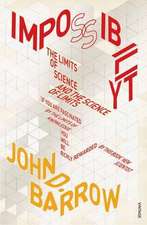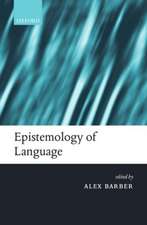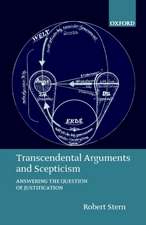Epistemology and Emotions
Autor Georg Brun, Ulvi Doguogluen Limba Engleză Paperback – 3 oct 2016
| Toate formatele și edițiile | Preț | Express |
|---|---|---|
| Paperback (1) | 479.42 lei 6-8 săpt. | |
| Taylor & Francis – 3 oct 2016 | 479.42 lei 6-8 săpt. | |
| Hardback (1) | 1033.34 lei 6-8 săpt. | |
| Taylor & Francis – 14 aug 2008 | 1033.34 lei 6-8 săpt. |
Preț: 479.42 lei
Nou
Puncte Express: 719
Preț estimativ în valută:
91.78€ • 95.40$ • 76.10£
91.78€ • 95.40$ • 76.10£
Carte tipărită la comandă
Livrare economică 06-20 februarie 25
Preluare comenzi: 021 569.72.76
Specificații
ISBN-13: 9781138245808
ISBN-10: 1138245801
Pagini: 222
Dimensiuni: 156 x 234 x 12 mm
Greutate: 0.45 kg
Ediția:1
Editura: Taylor & Francis
Colecția Routledge
Locul publicării:Oxford, United Kingdom
ISBN-10: 1138245801
Pagini: 222
Dimensiuni: 156 x 234 x 12 mm
Greutate: 0.45 kg
Ediția:1
Editura: Taylor & Francis
Colecția Routledge
Locul publicării:Oxford, United Kingdom
Notă biografică
Dr Georg Brun, Senior Research Fellow, Environmental Philosophy Group, Institute for Environmental Decisions, ETH Zürich, Switzerland; Dr Ulvi Doguoglu, Senior Research Associate, University of Zürich, Switzerland and Dr Dominique Kuenzle, Research Assistant, Department of Philosophy, University of Zürich, Switzerland.
Recenzii
’I recommend this collection. ...it provides an excellent snapshot of current research in, what will continue to be, a hot topic in epistemology.’ Metapsychology Online Reviews ’Epistemology and Emotions is a valuable collection of papers, a seminal work in what we can expect to become a productive new area of research. Brun, Doguoglu, and Kuenzle have done the discipline of philosophy a needed service in producing the first collection of its kind -- one we can hope will be the first of many.’ Notre Dame Philosophical Reviews ’Though a slim volume of just nine essays, Epistemology and Emotions is worth purchasing for its introduction alone, a near perfect summary of the theoretical activity behind the resurgence of interest in the function of emotions in epistemology. In a few pages, we are treated to lucid précis of the main positions, a fascinating account of the debates regarding the variety of emotions and the differences between affective states (such as emotions and moods), theories of emotion, and the various arguments against emotion’s epistemological significance. The fact that at least five of the essays are excellent presentations of the major positions makes this book a must-have for any philosopher interested in emotion, epistemology, or both.’ Philosophy in Review ’Research into the cognitive role of the emotions [...] is now progressing well and is, perhaps, the best evidence that many analytic philosophers think this kind of psychologism no longer an error but a necessity. This volume is a significant addition to this line of work, presenting as it does an interesting combination of original pieces that review, criticise, and build upon what has been done. Among the authors are some of the most significant researchers in the field, including Ronald de Sousa, whose The Rationality of Emotion (De Sousa 1987) was an early and influential contribution. Any multi-author collection of papers faces the potential difficulty that organisin
Cuprins
Introduction A New Role for Emotions in Epistemology?, Georg Brun, Dominique Kuenzle*We would like to thank Christoph Baumberger, Monika Betzler, Simone Dohle, Gertrude Hirsch Hadorn, Michael Roth and Alessandra Tanesini for helpful comments on earlier drafts.; Chapter One Emotion and Understanding, Catherine Z. Elgin*I am grateful to Amélie Rorty, Sabine Döring, and members of the University of Zürich Workshop on Epistemology and Emotions for comments on earlier drafts of this paper.; Chapter Two Epistemic Immediacy, Doubt and Anxiety: On a Role for Affective States in Epistemic Evaluation, Christopher Hookway; Chapter Three Virtues, Emotions and Fallibilism, Alessandra Tanesini*An earlier version of this paper was presented to the Philosophy Department at the University of Hull. I would like to thank Richard Gray, Michael Durrant, the editors of this volume and the audience in Hull for several very useful comments and queries.; Chapter Four Conflict Without Contradiction, Sabine A. Döring; Chapter Five Epistemic Immediacy and Reflection, Daniel Dohrn; Chapter Six Critical Reflections on Affective Epistemology, Markus Wild*Earlier versions of the paper were presented at the University of Zürich and the Humboldt University of Berlin. Many thanks to Simone Ungerer, Anik Waldow, Christopher Hookway, Martin Lenz, Dominik Perler, Alexander Staudacher, and Ulvi Do?uo?lu for discussion and criticism.; Chapter Seven Misleading Emotions, Peter Goldie; Chapter Eight How Cognition Meets Emotion: Beliefs, Desires and Feelings as Neural Activity, Paul Thagard*I am grateful to Ulvi Do?uo?lu and Benoit Hardy-Vallée for comments on an earlier draft. The Natural Sciences and Engineering Research Council of Canada provided research support.; Chapter Nine Epistemic Feelings, Ronald de Sousa*This paper has benefited as a result of many judicious comments by the editors, for which I am most grateful.;
Descriere
This volume is the first collection focusing on the claim that we cannot but account for emotions if we are to understand the processes and evaluations related to empirical knowledge. All essays are specifically written for this collection by leading researchers in this relatively new and developing field, bringing together work from backgrounds such as pragmatism and skepticism, cognitive theories of emotions and cognitive science, Cartesian epistemology and virtue epistemology.




















